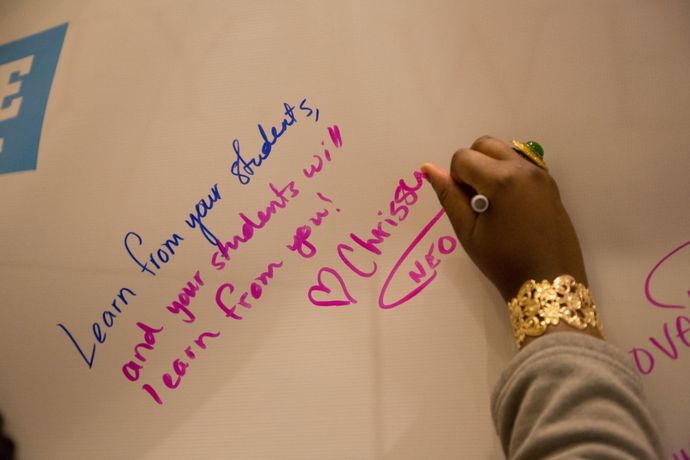Advice For Newbie Teachers

September 21, 2017
We know that your first time in the classroom can be both scary and exciting. So we reached out to three of our 2nd year corps members, Megan Sarnoski, Lauren Berry, and Brittany Bradshaw, to share some wisdom on how they got through year 1. Whether you’re a new teacher, a teacher returning to the classroom after a hiatus, or a seasoned educator, you’ll find their advice both timely and accurate.
Advice on Lesson Planning
Practice as much as possible! Practicing makes everything so much smoother when it's actually time for class. It also helps with classroom management, since a smooth plan leaves little time for students to be off-task. -Megan
Find/create a format that you can actually USE. Don't waste your time writing paragraphs upon paragraphs of scripting and such that you won't read when you are actually administering the lesson. That is not to say that scripting is not valuable. But time management is essential to thriving as a teacher, so if you're scripting out lessons and not even using them in class, scrap it! -Brittany
Advice on Self-Care as a Teacher
I was kind of bad at self-care last year, but I always made sure to repeat a mantra to myself when I was feeling down or stressed. Mine was "You're doing your best," because I was, no matter how much it felt like I was messing up. Be kind to yourself, give yourself grace and remind yourself that you're doing your best. -Megan
We don't talk enough about the mental and emotional strain that teaching causes--the real, dark, vulnerable stuff. Don't be afraid to have those raw conversations with those in your support system about what you're going through. –Lauren
I'm no self-care guru, but what I know for sure is that you can't take care of others of you don't take care of yourself. I show self-care by (occasionally) exercising, meal prepping for the week, and enjoying bubble baths with Netflix and wine. The point is really just to take some time for yourself. Do something that you actually enjoy and that feels good to you! -Brittany

Advice for Moms who Teach
Recognize when you're feeling tired or stressed. Acknowledging this was a huge step toward having some patience leftover for my own little one at the end of the day. Even though my daughter's only 3, I made sure to explain (in an age-appropriate way) to her when I was tired or stressed. It was with the goals of making myself slow down when I was stressed and teaching her some emotional awareness. - Megan
Classroom Management
Focus more on positive reinforcement and incentives. I see how the culture and feel of my class changes when I am more negative and punitive than rewarding. Classroom behavior gets worse when I am more punitive. It doesn't mean that you aren't firm. It means that you are using affirmation and praise as a motivator for students, instead of using discipline as a means to "scare" students into complying. (Even high schoolers love stickers & small candies!) - Lauren
“When a student has their head down, I acknowledge it. Sometimes, all it takes for a student to feel better is to know that someone noticed that they weren't okay.”
Advice for carrying out your vision for the classroom
Communicate your vision to your students! Part of mine has and always will be creating a space where students feel confident in their abilities and feel comfortable to make mistakes, so I tell them that. -Megan
Small steps that make a difference
I think really listening to parents and asking for parents' input is essential to making a difference in students' lives. Having a parent as a partner in a student's education helps a student to see that you're on their side. And make sure to contact parents when their students are doing well, not just when they're struggling! - Megan
When kids feel welcome in the classroom, the impact in their lives goes beyond that; it really means something to them even when they leave your room. To make my kids feel welcome, here are some things I do:
- Stand at the door and greet them by name when they enter.
- When a student is absent, I say something like "We missed you yesterday. Is everything okay?"
- When a student has their head down, I acknowledge it. Sometimes, all it takes for a student to feel better is to know that someone noticed that they weren't okay.
- Lauren


